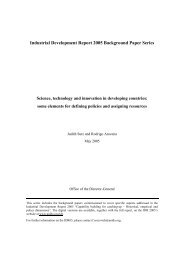Manual on the Development of Cleaner Production Policies ... - Unido
Manual on the Development of Cleaner Production Policies ... - Unido
Manual on the Development of Cleaner Production Policies ... - Unido
Create successful ePaper yourself
Turn your PDF publications into a flip-book with our unique Google optimized e-Paper software.
DEVELOPMENT OF CP POLICY<br />
MODULE 3: CP POLICY DEVELOPMENT CYCLE<br />
Divide participants into small groups <strong>of</strong> not more than six pers<strong>on</strong>s. Each group should go through<br />
<strong>the</strong> main steps in <strong>the</strong> policy development cycle. The steps are limited to four in <strong>the</strong> interests <strong>of</strong> brevity.<br />
Step 1: Analysing <strong>the</strong> existing situati<strong>on</strong> and ensuring support<br />
POSSIBLE INTERACTIVE EXCERCISE: Decide who are <strong>the</strong> most important stakeholders for CP<br />
and how <strong>the</strong>y can be involved in CP. Identify <strong>the</strong> sectoral policies, barriers and opportunities for CP in<br />
your country. (2 hours)<br />
Step 2: Setting priorities and objectives<br />
POSSIBLE INTERACTIVE EXCERCISE: Identify three priorities for your CP policy, with<br />
measurable objectives. (30 minutes)<br />
Step 3: Policy development including strategy, acti<strong>on</strong> plan and instruments<br />
POSSIBLE INTERACTIVE EXCERCISE: Develop an acti<strong>on</strong> plan for <strong>on</strong>e selected priority within <strong>the</strong><br />
CP policy, including two or three specific instruments. (2 hours)<br />
Step 4: Implementati<strong>on</strong> and evaluati<strong>on</strong><br />
POSSIBLE INTERACTIVE EXCERCISE: As part <strong>of</strong> <strong>the</strong> acti<strong>on</strong> plan, discuss how to include new<br />
stakeholders into policy development. How would you evaluate effectiveness <strong>of</strong> <strong>the</strong> policy?<br />
(30 minutes)<br />
SLIDE: Policy-making: general observati<strong>on</strong>s<br />
• There is no <strong>on</strong>e single “right” way <strong>of</strong> policy-making;<br />
• Policy-making is a l<strong>on</strong>g-term repetitive process;<br />
• Regular evaluati<strong>on</strong> and modificati<strong>on</strong> are necessary;<br />
• As many incentives as possible should be included.<br />
This slide introduces three important characteristics <strong>of</strong> <strong>the</strong> policy development<br />
process: (a) it is a l<strong>on</strong>g-term undertaking, involving substantial negotiati<strong>on</strong> and<br />
trial and error; (b) <strong>the</strong>re is a need for built-in flexibility to modify and adjust <strong>the</strong><br />
approach; and (c) <strong>the</strong>re are no universal soluti<strong>on</strong>s: each country has to develop<br />
policy in a way that meets its own needs and c<strong>on</strong>diti<strong>on</strong>s.<br />
Background<br />
There is no single correct way to develop CP policy. Every country must develop its own approach<br />
reflecting local priorities and objectives, political traditi<strong>on</strong>s and specific needs. While certain general<br />
principles should be observed, <strong>the</strong> actual process and details will vary from country to country.<br />
First and foremost, CP promoti<strong>on</strong> does not bel<strong>on</strong>g to any single government instituti<strong>on</strong>. CP is a crosscutting,<br />
multisectoral issue that needs to be integrated into various sectoral policies. Relevant activities<br />
may include, for instance, industrial development, instituti<strong>on</strong>al capacity development, educati<strong>on</strong> and<br />
promoting policy dialogue. Envir<strong>on</strong>mental and relevant n<strong>on</strong>-envir<strong>on</strong>mental agencies may need to be<br />
streng<strong>the</strong>ned, especially in <strong>the</strong>ir CP capacities.<br />
PAGE 49
















